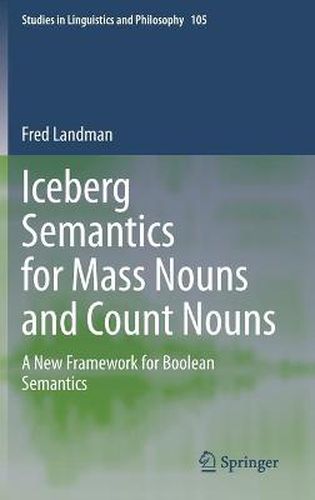Readings Newsletter
Become a Readings Member to make your shopping experience even easier.
Sign in or sign up for free!
You’re not far away from qualifying for FREE standard shipping within Australia
You’ve qualified for FREE standard shipping within Australia
The cart is loading…






This title is printed to order. This book may have been self-published. If so, we cannot guarantee the quality of the content. In the main most books will have gone through the editing process however some may not. We therefore suggest that you be aware of this before ordering this book. If in doubt check either the author or publisher’s details as we are unable to accept any returns unless they are faulty. Please contact us if you have any questions.
Iceberg semantics is a new framework of Boolean semantics for mass nouns and count nouns in which the interpretation of a noun phrase rises up from a generating base and floats with its base on its Boolean part set, like an iceberg. The framework is shown to preserve the attractive features of classical Boolean semantics for count nouns; the book argues that Iceberg semantics forms a much better framework for studying mass nouns than the classical theory does.
Iceberg semantics uses its notion of base to develop a semantic theory of the differences between mass nouns and count nouns and between different types of mass nouns, in particular between prototypical mass nouns (here called mess mass nouns) like water and mud versus object mass nouns (here called neat mass nouns) like poultry and pottery. The book shows in detail how and why neat mass nouns pattern semantically both with mess mass nouns and with count nouns.
Iceberg semantics is a compositional theory and in Iceberg semantics the semantic distinctions defined apply to noun phrases of any complexity. The book studies in depth the semantics of classifier noun phrases (like three glasses of wine) and measure noun phrases (like three liters of wine). The classical wisdom is that classifier interpretations are count. Recent literature has argued compellingly that measure interpretations are mass. The book shows that both connections follow from the basic architecture of Iceberg semantics. Audience: Scholars and students in linguistics - in particular semantics, pragmatics, computational linguistics and syntax - and neighbouring disciplines like logic, philosophy of language, and cognitive science.
$9.00 standard shipping within Australia
FREE standard shipping within Australia for orders over $100.00
Express & International shipping calculated at checkout
This title is printed to order. This book may have been self-published. If so, we cannot guarantee the quality of the content. In the main most books will have gone through the editing process however some may not. We therefore suggest that you be aware of this before ordering this book. If in doubt check either the author or publisher’s details as we are unable to accept any returns unless they are faulty. Please contact us if you have any questions.
Iceberg semantics is a new framework of Boolean semantics for mass nouns and count nouns in which the interpretation of a noun phrase rises up from a generating base and floats with its base on its Boolean part set, like an iceberg. The framework is shown to preserve the attractive features of classical Boolean semantics for count nouns; the book argues that Iceberg semantics forms a much better framework for studying mass nouns than the classical theory does.
Iceberg semantics uses its notion of base to develop a semantic theory of the differences between mass nouns and count nouns and between different types of mass nouns, in particular between prototypical mass nouns (here called mess mass nouns) like water and mud versus object mass nouns (here called neat mass nouns) like poultry and pottery. The book shows in detail how and why neat mass nouns pattern semantically both with mess mass nouns and with count nouns.
Iceberg semantics is a compositional theory and in Iceberg semantics the semantic distinctions defined apply to noun phrases of any complexity. The book studies in depth the semantics of classifier noun phrases (like three glasses of wine) and measure noun phrases (like three liters of wine). The classical wisdom is that classifier interpretations are count. Recent literature has argued compellingly that measure interpretations are mass. The book shows that both connections follow from the basic architecture of Iceberg semantics. Audience: Scholars and students in linguistics - in particular semantics, pragmatics, computational linguistics and syntax - and neighbouring disciplines like logic, philosophy of language, and cognitive science.